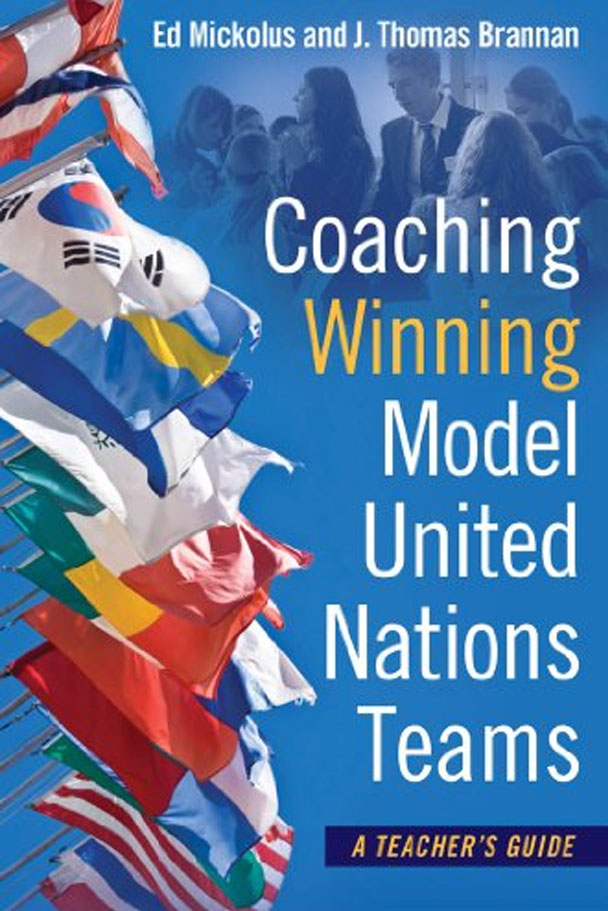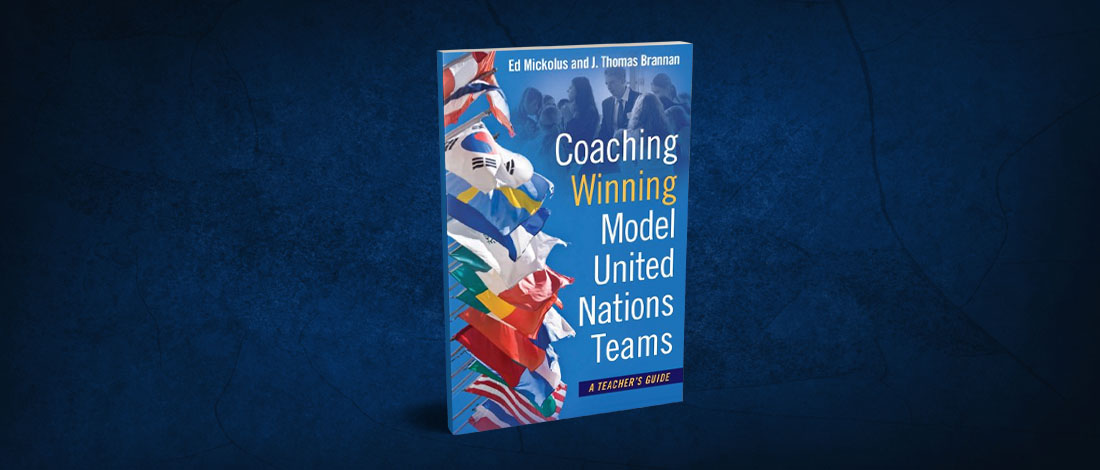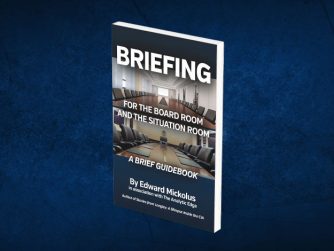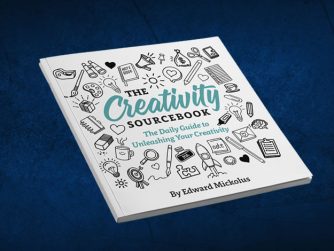By some counts, Model United Nations (MUN) has become the single most popular extracurricular academic activity among high school students. More than two million high school and college students have assumed the roles of ambassadors from real United Nations member countries, participated in spirited debate about the world’s most pressing issues, and called, “Point of order, Mr. Chairman!”
Now, in Coaching Winning Model United Nations Teams, Ed Mickolus and J. Thomas Brannan give MUN teachers and coaches the information they need to succeed. In this informative volume, the authors (MUN coaches themselves) provide detailed guidance for each step of the MUN path, from the first meeting in the teacher’s classroom to the final days of an official MUN conference.
Coaches will learn about the ins and outs of parliamentary procedure and the most effective ways to help their students draft position papers and resolutions.
Most important, Mickolus and Brannan illustrate the many ways that teachers can inspire their students to take an active role in making the world a better place.
By the time their students move on, MUN coaches will have instilled in them such important qualities as empathy, self-confidence, and grace under pressure.
Coaching Winning Model United Nations Teams is a fun, useful guide for teachers and coaches who are working to help develop tomorrow’s leaders today.
- Title : Coaching Winning Model United Nations Teams: A Teacher’s Guide
- Authors : Edward Mickolus
- Publisher : Potomac Books
- Publication Date : July 1, 2013
- Paperback : 232 pages
- ISBN-10 : 1612346030
- ISBN-13 : 978-1612346038
- Item Weight : 12 ounces
- Dimensions : 5.9 x 0.7 x 8.9 inches

Reviews
Introduction
By some counts, Model United Nations has become the single most popular extracurricular academic activity among high school students. More than two million high schoolers and college students have had occasion to call “point of order, Mr. Chairman!” at some point since the founding of the United Nations. MUN alumni have included actor Samuel L. Jackson, Chelsea Clinton, US Supreme Court Justice Steven Breyer, and World Court (International Court of Justice) Justice Stephen Schwebel. MUN has even been mentioned at the movies, with Jennifer Anniston and Ben Stiller playing MUN alumni. You can find MUN clubs or classes in most US states, and dozens of countries around the world.
At MUNs, students have the opportunity to step out of their high school roles for a day or more, and step into the role of the ambassador of a country that they may never visit. They learn geography, their adoptive country’s history, politics, economics, society, culture, and language; issues facing that country and its place in its region and the world; international politics; and a myriad of issues that have challenged their predecessors and which they will meet in their adulthood. They can and will make friendships within their school and with members of other teams that can last a lifetime.
We resurrected our high school’s MUN team in September 2002, when Ed’s daughter was an entering freshman and Ed volunteered to help Tom start the team. We soon found, however, that although there are numerous sources on what the UN is all about, there was no one source of practical information on the care and feeding of an MUN team. This volume is our attempt to help other sponsors and coaches learn from our mistakes and jump-start your start-up or revitalization efforts.
There are several approaches to teaching/coaching MUNing, which can be boiled down to: academic/noncompetitive and competitive. The approach you pick will be determined largely by the philosophy you bring to the table on what you are trying to accomplish with MUNing.
We teach MUNing as a competitive sport with academic overtones, much the way similar intellectual endeavors–High School Bowl/It’s Academic, debate, forensics, DECA–can be and are treated. We believe that a focus on winning can generate all of the benefits of the noncompetitive approach but has the added value of
–motivating the students
–helping to generate funds from boosters, corporations, and other monetary sources
–generating publicity for your program
–boosting recruiting (via the added funding and publicity, and the word-of-mouth created in the hallways from your winning students)
The competitive approach gives your students focus on a shared goal, and leads them to do all of the other things that they should do anyway, including:
–researching
–writing position papers, resolutions, amendments, press releases
–practicing several forms of public speaking
–honing interpersonal/persuasive skills (what we call “schmoozing”)
–learning about parliamentary procedure and how to use it
–developing creative problem-solving abilities
While you have the opportunity to teach them a host of substantive issues–terrorism, weapons proliferation, child soldiers, rights of women, AIDS, status of international treaties, etc.–you can soon be overwhelmed with the sheer breadth of issues that any given conference’s committees will cover. Ultimately, it does not matter whether they can solve the world’s crises. They are, after all, high schoolers and will in all likelihood not have the access to the world’s policy councils to make a difference immediately on these issues.
Rather, what you have the opportunity to do is give them life lessons that will stay with them far beyond a conference, or a season. You can bring out in them such qualities as:
–empathy
–self-confidence
–social skills
–persuasiveness
–leadership
–organizational skills
–knowing how to get to the heart of the matter
–active listening
–grace under pressure
–thinking on one’s feet
–acting skills
–prioritizing
MUN skills will include acting–thestudents are portraying the Ambassador of another country. But rather than playing a role during a one- or two-hour performance on stage, MUN actors portray that character for days at a time. The students no longer are mere high schoolers–they put on the costume (either Western business attire or local formal business garb) of the country they represent, and are Ambassadors (for their adoptive country and for your school) from the moment they arrive at an MUN conference until the time the conference adjourns.
MUN skills include those found in other team sports–abiding by the rules, learningto play a specific role on the team, cooperating with other members of the team, and sometimes sacrificing personal goals for the good of the team.
MUN skills include the same type of representational skills that one needs to practice law. The successful attorney does not reveal his/her own opinions about the case at hand, but rather represents his/her client in the best light possible. So, too, should the student represent his/her country. At the conference, the only views that matter are those of the government which the student represents.
This brings us to a fundamental difference between the competitive and noncompetitive philosophy of MUNing. Noncompetitive sponsors will argue that the purpose of the United Nations is to resolve differences among nations by discussing these differences and coming to compromises peacefully. Gentle give-and-take will thus prevent military conflicts and resolve major international and regional crises. You will often see variants of these sentiments in the welcoming documents issued by the secretariats (organizing committees) of the conferences you attend.
The competitive viewpoint argues that one should focus on representing your adoptive country well, not necessarily on problem-solving, compromise, etc. While the articulated purpose of the United Nations may well be as described above, this may or may not be the view of what the Foreign Ministry of your adoptive country wants its international organizations’ delegations to do. Rather, delegations are there to get the best deal for their country through diplomacy. Under this view, it does not matter if you lose a vote in the 192-nation General Assembly by 191-1, if you correctly represented the principles articulated by your government’s leadership. You are not at a conference to unilaterally rewrite your adoptive nation’s policy, and are not being evaluated by how many resolutions you passed, sponsored, or supported. If a real-world diplomat does not correctly represent their government’s policy positions, s/he is soon out of a job (and perhaps before a firing squad), or can resign in protest.
We come down strongly on the side of competitive MUNing, although we suspect that you’ll also be able to pick up a useful hint or two if you’re of the noncompetitive spirit. So let’s get started.
Table of Contents
Dedication
About the Authors
Introduction
Getting Started
—-Recruiting
—-Where to Meet
Fundraising
Scheduling
—-Where to Go
—-Who Should Go
The Triangle Offense and Defense
Parliamentary Procedure
—-Offense
—-Defense
—-The Playbook
—-Commentary on Rules
MUN-Style Public Speaking
Research
—-What to Research
—-Packaging Your Research
Care and Feeding of Your Website
What To Do at a Conference
—-Registration
—-Dress
—-Comportment
—-The Field of Play
Line of March
—-General Debate
—-Caucuses–Moderated and Unmoderated
—-Setting the Agenda
—-Resolutions
—-Voting
The Coach’s Role at the Conference
How Students Can Help Your Team Outside of the Conference
Diversity
Ethics
Appendices
A. UN Factsheet
B. Awards Criteria
C. Sample Background Papers
Nuclear Non-Proliferation
Narcotics Trafficking
Global Warming and Climate Change
Sea Piracy
D. Sample Position Paper
Syria in DISEC
E. General Research Sites and Other Internet Resources
F. Lesson Plans
Speaking Opportunities
Speechwriting
Basic MUN Public Speaking
Rules Cheat Sheets; finding loopholes
Research: Public and Private Position Papers
Resolution Writing
Playing Offense
Answering Questions: Hostile and 2nd speaker
Playing Defense
Practice Sessions
G. Further Reading





